- Home
- William Gibson
All Tomorrow's Parties Page 16
All Tomorrow's Parties Read online
Page 16
When he got it open, he settled down on the foot of the bed with his beef bowl and the plastic spoon they'd given him. He was just inhaling the steam when it came to him he should check on the thermos-thing. The projector, Laney had called it. He sighed, put his beef bowl down, and got up (well, he had to crouch).
The GlobEx box was in the cabinet there, beside his bag, and the spun-metal cylinder was in the GlobEx box.
He sat back down, with the GlobEx box next to him on the bed, and got to work on his beef bowl, which was worth waiting for. It was strange how this kind of shaved, basically overcooked mystery meat, which he guessed really was, probably, beef, could be tastier, under the right circumstances, than a really good steak. He ate the whole thing, every last grain of rice and drop of broth and figured the tourist-trap map had put their three stars and a half in the right place.
Then he opened the GlobEx box and got the thermos-thing out. He looked at the FAMOUS ASPECT sticker again, and it didn't tell him any more than it had before. He stood the thing up on its base, on the green-and-orange carpet, and crawled back up the bed to get the switchblade. He used that to slice open the plastic envelopes containing the two cables and sat there looking at them.
The one that was standard power just looked like what you used to run a notebook off the wall, he thought, although the end that went into the thermos looked a little more complicated than usual. The other one though, the jacks on either end looked serious. He found the socket that one end of this obviously went into, but what was the other end supposed to fit? If the sumo kid was telling the truth, this was a custom cable, required to jack this thing into something that it might not usually be required to jack to. This one was optical, it looked like.
The power cable, that was easy. What took a while was finding a socket up here, but it turned out there was one (well, actually the end of an industrial-grade yellow extension cord) in the storage cabinet.
No control on the thing, that he could see, no switches. He plugged the power cable into the wall socket, then sat on the bed, the other end in his hand, looking at the silvery cylinder.
“Hell,” he said and plugged the cable into the cylinder. Just as he did, he had the clearest possible vision of the thing being, absolutely and no doubt, brimful of plastic explosive and a detonator, just waiting for this juice—
But, no, if it had been, he'd be dead. He wasn't.
But the cylinder wasn't doing anything either. He thought he could hear a faint hum from it, and that was it.
“I don't get it,” Rydell said.
Something flickered. Neon butterfly. Torn wings.
And then this girl was there, kneeling, right up close, and he felt his heart roll over, catch itself.
The how of her not being there, then being there. Something hurt in his chest, until he reminded himself to breathe.
If Rydell had had to describe her, he would've said beautiful, and been utterly frustrated in the attempt to convey how. He thought she had to be one of Durius' examples of hybrid vigor, but saying which races had been mixed was beyond him.
“Where are we?” she asked.
He blinked, uncertain as to whether she saw and addressed him, or someone else, in some other reality. “Bed-and-breakfast,” he said, by way of experiment. “San Francisco-Oakland Bay.”
“You are Laney's friend?”
“I — Well. Yeah.”
She was looking around now, with evident interest, and Rydell felt the hairs stand up along his arms, seeing that she wore an outfit that exactly mirrored his own, though everything she wore fit her perfectly, and of course looked very different on her. Loose khakis, blue workshirt, black nylon jacket with a Velcro rectangle over the heart, where you stuck the logo of your company. Right down to black socks (with holes? he wondered) and miniature versions of the black Work-‘N‘-Walks he'd bought for Lucky Dragon. But the hair on his arms was up because he knew, he had seen, he had, that in the first instant of her being there, she'd crouched before him naked.
“I am Rei Toei,” she said. Her hair was coarse and glossy and roughly but perfectly cut, her mouth wide and generous and not quite smiling, and Rydell put out his hand and watched it pass right through her shoulder, through the pattern of coherent light he knew she must be. “This is a hologram,” she said, “but I am real.”
“Where are you?” Rydell asked, withdrawing his hand.
“I'm here,” she said.
“But where are you really?”
“Here. This is not a broadcast hologram. It is generated by the Famous Aspect unit. I am here, with you. Your room is very small. Are you poor?” She crawled past Rydell (he supposed she could've crawled through him, if he hadn't moved aside) to the head of his bed, examining the salt-caked hemisphere of plastic. Rydell could see now that she literally was a source of illumination, though somehow it reminded him of moonlight.
“It's a rented room,” Rydell said. “And I'm not rich.”
She looked back at this. “I meant no offense.”
“That's okay,” Rydell said, looking from her to the projector and back. “I mean, a lot of people, they'd think I'm poor.”
“But more would think you rich.”
“I don't know about that—”
“I do,” she said. “There are, literally, more humans alive at this moment who have measurably less than you do. You have this sleeping place, you have clothing, I see you have eaten. What is your name?”
“Berry Rydell,” he said, feeling a strange shyness. But he thought he at least knew who she was, or was supposed to be. “Look, I recognize you. You're that Japanese singer, the one who isn't… I mean, the one who—”
“Doesn't exist?”
“I didn't say that. I mean, weren't you supposed to be married to that Irish guy, Chinese, whatever? In that band?”
“Yes.” She'd stretched out on the bed, on her stomach, hands propping her chin a few inches from the occluded plastic bubble. (Rydell had a flash of that seen from the water below, like the glaucous eye of some behemoth.) “But we did not marry, Berry Rydell.”
“How do you know Laney?” he asked her, hoping to bring it around to some footing that he could stand on as well, whatever that might be.
“Laney and I are friends, Berry Rydell. Do you know where he is?”
“Not exactly,” Rydell said, which was true.
She rolled over, gorgeous and quite literally glowing, in her incongruous mirroring of what he wore, which looked, on her, like the first and purest expression of some irresistible new fashion, and fixed him with a sorrowful stare. He would, in that moment, have happily and willingly locked eyes with her for however long she wanted and have sat there, effectively, forever. “Laney and I have been separated. I do not understand why, but I must trust that it is for our mutual and eventual good. Who gave you the projector, Berry Rydell?”
“I don't know,” Rydell said. “It was shipped here GlobEx, but in Laney's name. Address in Melbourne, company called Paragon-Asia.”
She raised her eyebrows. “Do you know why we are together in San Francisco, Berry Rydell?”
“No,” he said, “do you?”
“Laney believes that the world will end soon,” she said, and her smile was luminous.
He couldn't help but smile back. “I think we went through that one when the century rolled over.”
“Laney says that that was only a date. Laney says that this is the real thing. But I have not spoken with him in weeks, Berry Rydell. I do not know how much closer we are now, to the nodal point.”
37. A LITTLE SHIT MONEY
BOOMZILLA, with a little shit money tonight, debit chip he got off those truck bitches, goes down to Lucky Dragon. That's where he goes when he gets money, because they got all the shit.
Food he likes there, because it's not bridge food; food like on TV, out of a package. And everything: shit to look at, the games they got in there. Best place.
Someday he'll have his shit together right. He'll live in a house,
and it will be clean as Lucky Dragon. All lit up like that, and he'll get those camera balloons like the truck bitches. Watch everybody's ass and nobody fuck with him.
Gets the chip out, walking up to the front, because if he has it in his hand, shows it to the security, security'll let him in. Security wants to know you're a player. Otherwise, you'd steal. Boomzilla understands that.
Tonight is different. Tonight a big white truck in front of Lucky Dragon. Biggest, cleanest truck he's ever seen. No writing on it, SoCal plates, couple of securities standing out by it. Boomzilla wonders if this what they bring the new games in? Never seen this before.
So in the doors, holding up his chip, and heads over, like he does, first to the candy.
Boomzilla likes this Jap candy that's like a little drug lab. You mix these different parts, it fizzes, gets hot, cools. You do this extrusion-molding thing and watch it harden. When you eat it, it's just candy, but Boomzilla likes making it.
Gets six of those, pissed there's no grape, and a couple or two chocos. Spends a good long time by the machine that makes magazines, watching screens, all the different shit you can get put in your magazine. Then back to get his noodles, kind you add water and pull the string.
Back there, deciding between beef and chicken, he sees they've unfastened a whole piece of Lucky Dragon wall. Next to GlobEx and the cash machine.
So he thinks this is what the white truck is about, some new thing to put in there, and he wonders if it's maybe a game.
White men in white paper suits working on the section of wall.
Watches them, then goes back to the front, shows his shit. Checker runs his shit over the window that counts, takes Boomzilla's chip and debits it. There goes his shit money.
Takes his bag outside and finds a curb to sit on. Pretty soon he'll start making the first candy. Red one.
He looks past the white truck to the screens there, by the front, and he notices white trucks on half the screens. So all over the world now, these white trucks sitting outside Lucky Dragons, so it must mean something new is being put in all of them tonight.
Boomzilla unseals the candy and studies the multistage but entirely nonverbal instructions.
Gotta get it right.
38. VINCENT BLACK LIGHTNING
FONTAINE'S shop must be this narrow purple one with its high thin window caulked with enough silicone to frost a wedding cake. The whole front of the place had been painted the same flat purple, blistered now by sun and rain, and she had some faint memory of its earlier incarnation as something else, used clothing maybe. They'd put that purple over everything: over the droops and gobs of silicone, over the hardware on the old wooden door with its upper panels replaced with glass.
If this was Fontaine's place, he hadn't bothered naming it, but that was like him. And the few things displayed in the window, under the beam of an antique Tensor, were like him as well: a few old-fashioned watches with their dials going rusty, a bone-handled jackknife someone had polished till it shone, and some kind of huge ugly telephone, sheathed in ridged black rubber. Fontaine was crazy about old things, and sometimes, before, he'd bring different pieces over, show them to Skinner.
Sometimes she'd thought he'd just done that to get the old man started, and then Skinner's own stories would come out. He hadn't been much for stories, Skinner, but turning some battered treasure of Fontaine's in his hands, he'd talk, and Fontaine would sit and listen, and nod sometimes, as though Skinner's stories confirmed some long-held suspicion.
Made privy to Skinner's past, Fontaine would then handle the objects himself with a new excitement, asking questions.
Fontaine lived in the world of things, it had seemed to her, the world of the things people made, and probably it was easier for him to approach them, people, through these things. If Skinner couldn't tell Fontaine a story about something, Fontaine would make up his own story, read function in the shape of something, read use in the way it was worn down. It seemed to comfort him.
Everything, to Fontaine, had a story. Each object, each fragment comprising the built world. A chorus of voices, the past alive in everything, that sea upon which the present tossed and rode. When he'd built Skinner's funicular, the elevator that crawled like a small cable car up the angled iron of the tower, when the old man's hip had gotten too bad to allow him to easily climb, Fontaine had had a story about the derivation of each piece. He wove their stories together, applied electricity: the thing rose, clicking, to the hatch in the floor of Skinner's room.
Now she stands there, looking into the window, at these watches with their foxed faces, their hands unmoving, and she fears history.
Fontaine will fit her to history in some different way, she knows, and it is a history she has avoided.
Through the thick pane of the door, thick enough to bend light, the way water in a glass does, she sees that the lights are on in a space behind the shop. Another door there, not quite closed.
CLOSED/CERRADO says the dog-eared cardboard sign hung inside the glass on a suction-cup shower hook.
She knocks.
Almost immediately the inner door is opened, a figure silhouetted there against brightness.
“Hey, Fontaine. Chevette. It's me.”
The figure shuffles forward, and she sees that it is in fact him, this angular black man whose graying hair is twisted into irregular branches that hang like the arms of a dusty houseplant in need of water. As he rounds the flat gleam of a glass-topped counter, she sees that he holds a gun, the old-fashioned kind with the cylinder that turns as the bullets are fired manually, one at a time. “Fontaine? It's me.”
He stops there, looking. Takes a step forward. Lowers the pistol. “Chevette?”
“Yeah?”
“Hold on.” He comes forward and peers at her, past her. “You alone?”
“Yes,” she says, glancing to either side.
“Hold on—” a rattling of locks, bolts undone, and at last the door opens, and he blinks at her, mystified. “You back.”
“How are you, Fontaine?”
“Fine,” he says, “fine,” and steps back. “Come in.”
She does. The place smells of machine oil, metal polish, burnt coffee. A thousand things gleam from the depths of Fontaine's history reef.
“Thought you were in LA,” he says.
“I was. I'm back…”
He closes the door and starts locking it, an elaborate process but one he can do in the dark, in his sleep perhaps. “Old man's gone. You know?”
“I know,” she says. “How?”
“Just old,” he says, tucking his pistol away now. “Wouldn't get out of bed, finally. Curled up there like a baby. Clarisse she came to nurse him. She been a nurse, Clarisse. Says when they turn to face the wall, that means it's over soon.”
Chevette wants so badly to say something, but it will not come.
“I like your hair, girl,” Fontaine says, looking at her. “Not so fierce now.”
“IT'S changing,” Fontaine says, meaning the bridge and how they live on it. He's told her about the tendency to build these shops, how most of them are built with nonresident money, the owners hiring people to live there and maintain possession. “That Lucky Dragon,” he says, cupping a white china mug of his bitter, silted coffee, “that's there because someone decided the money was there for it to make. Tourists buying what they need to come out here. That wouldn't have happened, before.”
“Why do you think it is, that it's changing?”
“It just is,” he says. “Things have a time, then they change.”
“Skinner,” she says, “he lived out his life here, didn't he? I mean, when this was all what it was. He was here for all of that. Here when they built it.”
“Not his whole life. Just the end of it. That jacket you're wearing, he got that in England, when he was younger. He lived there and rode motorcycles. Told me about it. Rode them up to Scotland, rode them all over. Real old ones.”
“He told me a little about it, once,” she s
ays. “Then he came back here and the Little Big One came. Cracked the bridge. Pretty soon he was out here.”
“Here,” he says, “I'll show you something.” Opening a cabinet. Brings out a sheath knife, greenish handles inlaid with copper abstracts. Draws it from the waxed brown saddle leather. Blade of Damascus steel, tracked with dark patterns.
The knife of Chevette's memories, its grip scaled with belt-ground segments of phenolic circuit board.
“I saw that made,” she says, leaning forward.
“Forged from a motorcycle drive chain. Vincent ‘Black Lightning,’ 1952. Rode that in England. It was a good forty years old too, then. Said there wasn't ever a bike to match it. Kept the chain till he found this maker.” Passes the knife to her. Five inches of blade, five inches of handle. “Like you to have it.”
Chevette runs her finger along the flat of the blade, the crocodile pattern of light and dark steel that had been formed as the links were beaten out. “I was thinking about this before, Fontaine. Today. How we went to where the smith worked. Burned coke in an old coffee can.”
“Yes. I've seen it done.” Hands her the sheath.
“But you need to sell this stuff.” Tries to hand it back.
“It wasn't for sale,” he says. “I was keeping it for you.”
FONTAINE has a strange boy in the shop's back room. Heavy, Hispanic, hair cut short. He sits the whole time, cross-legged, his head in an old eyephone rig that looks like it came out of some military robotics dump. With a worn-out old notebook on his lap. Endlessly, steadily, clicking from one screen to the next.

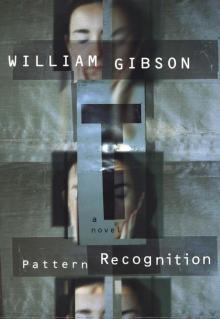 Pattern Recognition
Pattern Recognition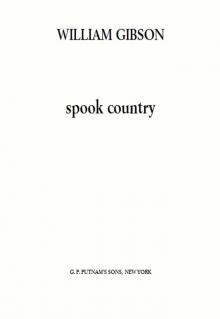 Spook Country
Spook Country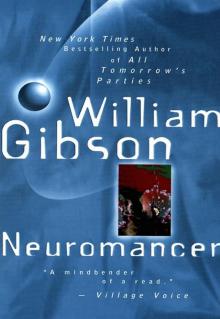 Neuromancer
Neuromancer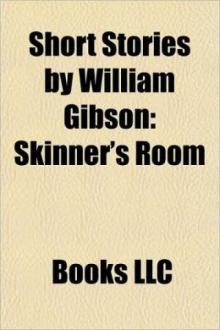 Skinner's Room
Skinner's Room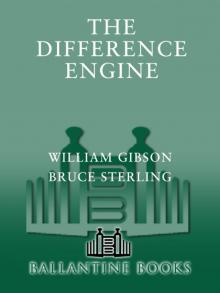 The Difference Engine
The Difference Engine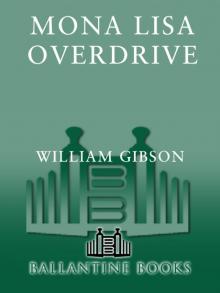 Mona Lisa Overdrive
Mona Lisa Overdrive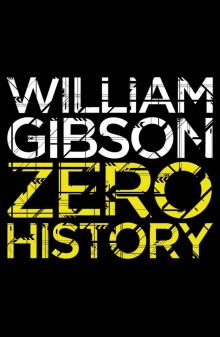 Zero History
Zero History The Peripheral
The Peripheral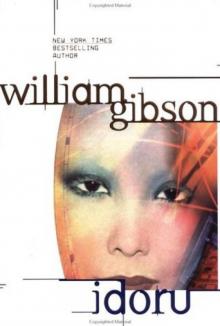 Idoru
Idoru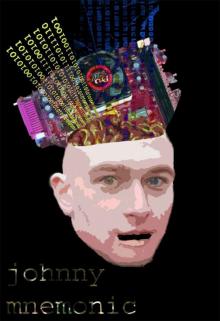 Johnny Mnemonic
Johnny Mnemonic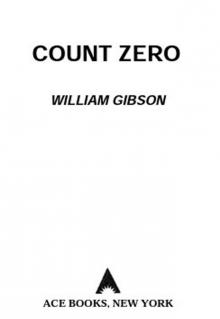 Count Zero
Count Zero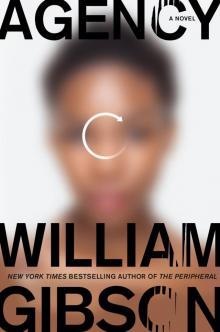 Agency
Agency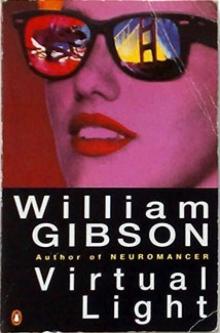 Virtual Light
Virtual Light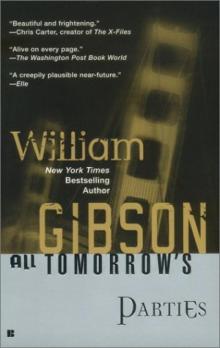 All Tomorrow's Parties
All Tomorrow's Parties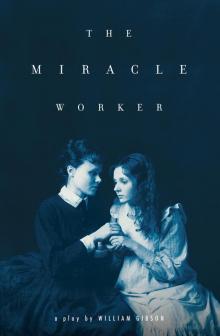 The Miracle Worker
The Miracle Worker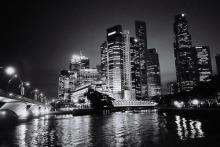 Disneyland with the Death Penalty
Disneyland with the Death Penalty Idoru tb-2
Idoru tb-2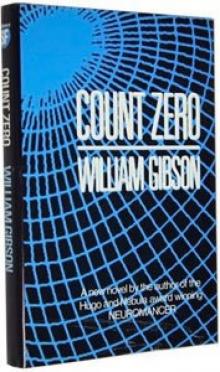 Count Zero s-2
Count Zero s-2 The Gernsback Continuum
The Gernsback Continuum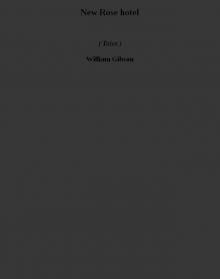 New Rose hotel (tales)
New Rose hotel (tales)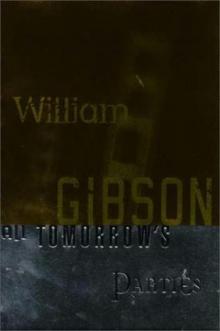 All Tomorrow's Parties bt-3
All Tomorrow's Parties bt-3 Hinterlands
Hinterlands Thirteen Views Of A Cardboard City
Thirteen Views Of A Cardboard City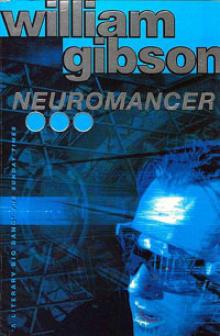 Neuromancer ts-1
Neuromancer ts-1 Virtual light b-1
Virtual light b-1